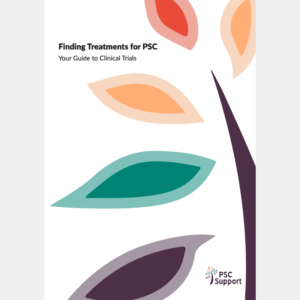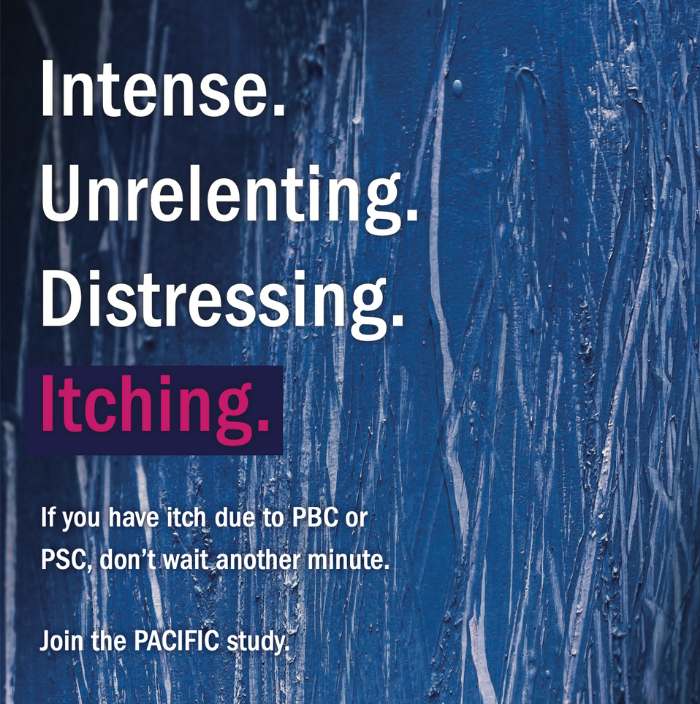The PACIFIC Study - Fully recruited
Evaluating EP547 in People with Cholestatic Itch due to Primary Biliary Cholangitis or Primary Sclerosing Cholangitis (PACIFIC)
Thinking of taking part?
- Check how suitable you are by looking at the information below.
- Check our map to see if you can get to a study site.
- Contact the research team for more details if you think you are suitable. Check back regularly as we are adding more contact info every day.
- Got a question? Our Clinical Trials Pack has lots of information about how to join clinical trials, switching hospitals for trials and what's involved.
- Contact us if you need any help.
Quick Links
About EP547
People with cholestatic liver diseases like primary sclerosing cholangitis (PSC) or primary biliary cholangitis (PBC) often experience severe itch (pruritus), which can affect the amount and quality of sleep, degree of tiredness, and overall quality of life.
How itch occurs in these individuals is not fully understood.
However, in people with liver disease there can be a build-up in the blood and in the skin of certain chemicals found in bile (a fluid made by your liver to aid in digestion). It has long been suspected that these chemicals cause itch. More recently, it was discovered that these chemicals activate a receptor known as MRGPRX4, which is found on nerve cells in the skin known to cause itch.
EP547 is a unique compound that is designed to block activators of MRGPRX4, which may lead to less itching. EP547 is not intended to improve the liver disease associated with PBC or PSC, but rather to help reduce the itch that liver disease can cause.
| Trial Name | The PACIFIC Study
Study to Evaluate EP547 in Subjects With Cholestatic Pruritus Due to Primary Biliary Cholangitis or Primary Sclerosing Cholangitis (PACIFIC) |
| ClinicalTrials.gov Identifier | NCT05525520 |
| Phase | Phase 2 |
| Intervention | EP547 (or placebo) oral tablets once daily |
| Recruiting now? | Fully recruited |
| Liver disease diagnosis | Confirmed diagnosis of PSC or PBC based on clinical guidelines |
| Age | 18 -80 years |
| Females: can I be pregnant? | No |
| Is IBD allowed? | Yes, if meeting additional relevant criteria |
| Is there an ALP (alkaline phosphatase) requirement? | No |
| Can I take UDCA (Urso)? | Yes, UDCA use is allowed if you have been treated for at least one year, have been on a stable dose for at least 12 weeks, and maintain that dose during the study |
| Can I take part if I have a stent? | No, you cannot take part if you have a biliary stent |
| Are recent acute cholangitis (ie bacterial cholangitis) attacks allowed? | No, you must not have had a cholangitis attack for at least 3 months |
| Can I take part if I have had a liver transplant? | No |
| Is cirrhosis allowed? | No |
| Previous studies and information |
|
| Are travel expenses covered? | The study staff can tell you about any reimbursement for travel-related expenses or compensation that may be available. |
| Procedures and tests include: | Questionnaires on a mobile device, blood and urine tests, and liver transient elastography (Fibroscan) at Screening. A biopsy is not required. |
| How many study visits will there be? How long will each study visit be? | There are a total of 9 study visits which generally last 1-2 hours. Some visits may be conducted remotely from your home if you wish. |
| Duration of study | Study participation lasts about 4 months |
| Basic design of study | This is a randomised, double-blind, placebo-controlled study with a 1:1 randomisation. This means participants have a 50% chance of getting the study drug and a 50% chance of getting the placebo (dummy drug) for a treatment period of six weeks. This is followed by an open-label extension, meaning that all participants will receive the study drug after completing the six-week treatment period. |
| More information | PACIFICitchstudy.com
In people with liver disease, there can be a build-up in the blood and in the skin of certain chemicals that are suspected to cause itch. More recently, it was discovered that these chemicals activate a receptor known as MRGPRX4, which is found on nerve cells in the skin known to cause itch. EP547 is a unique compound that is designed to block activators of MRGPRX4, which may lead to less itching. |
| Link to Sponsor | Escient Pharmaceuticals |


